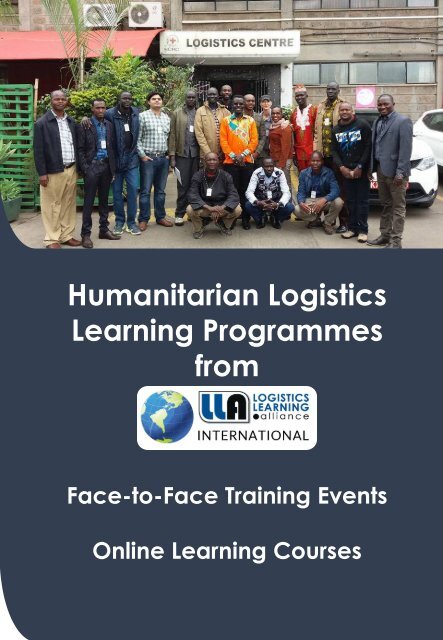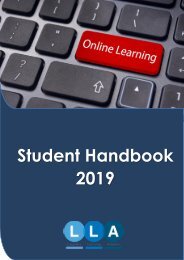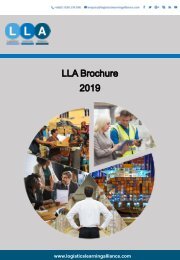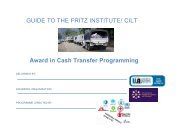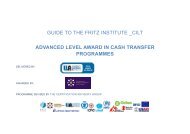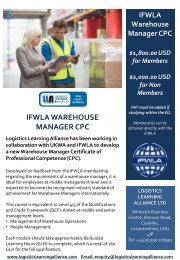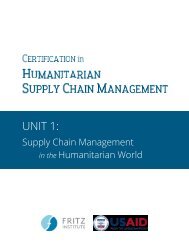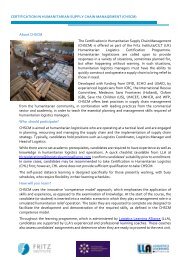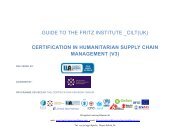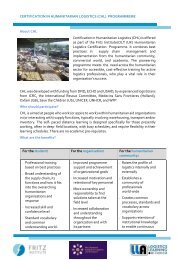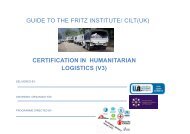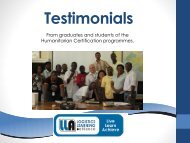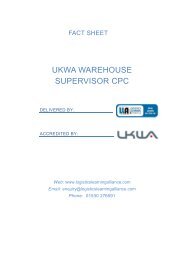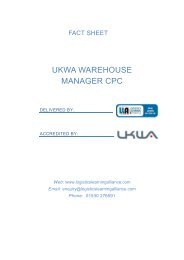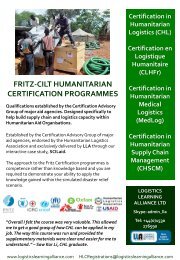Humanitarian Logistics Brochure 2017-18
LLA Humanitarian Logistics and Supply Chain Management brochure 2017-18
LLA Humanitarian Logistics and Supply Chain Management brochure 2017-18
Create successful ePaper yourself
Turn your PDF publications into a flip-book with our unique Google optimized e-Paper software.
<strong>Humanitarian</strong> <strong>Logistics</strong><br />
Learning Programmes<br />
from<br />
Face-to-Face Training Events<br />
Online Learning Courses
Face-to-Face Learning Events<br />
HELM – A new kind of training experience<br />
for humanitarian logisticians<br />
The <strong>Humanitarian</strong> Essentials <strong>Logistics</strong> Modules (HELM) are<br />
designed for those new to the humanitarian sector or those<br />
wanting to refresh their humanitarian logistics and supply<br />
chain knowledge.<br />
Principally designed to be delivered through Events for 7-14<br />
people the modules can easily be adapted or mixed to meet the<br />
specific learning needs and requirements of all humanitarian<br />
organisations.<br />
This course is delivered exclusively by LLA<br />
Endorsed by
Why You Should Attend a HELM Event<br />
There are no entry requirements for participating in a HELM Event<br />
– the course is open to anyone either working in, or with an<br />
interest in, humanitarian logistics. You don’t need to be working<br />
for a humanitarian organisation, either. You can study as an<br />
individual learner.<br />
A typical HELM learner could be:<br />
✓ A newcomer to humanitarian logistics<br />
✓ An experienced logistician looking to refresh their skills<br />
✓ Working for an NGO or organisation<br />
✓ A team leader or manager who wants to improve their skills<br />
✓ A group of employees at an NGO or organisation<br />
✓ Looking to move into the sector<br />
Once you have completed your HELM Event, you might want to<br />
move on towards studying a formal humanitarian qualification,<br />
such as the Fritz-CILT Certification in <strong>Humanitarian</strong> <strong>Logistics</strong><br />
(CHL) which is exclusively delivered on behalf of a UK Awarding<br />
Organisation by LLA. (See pages 6 – 9)
Course Content for HELM<br />
There are a total of 6 modules available to study, as well as the<br />
HELM Advanced Supply Chain Manager. The modules are<br />
designed to guide you around the basic requirements in each area,<br />
in the context of the humanitarian supply chain.<br />
HELM 1<br />
Supply Chain<br />
Warehousing & Inventory<br />
Fleet Management & Transport<br />
HELM 2<br />
Procurement<br />
Medical <strong>Logistics</strong><br />
Management vs Leadership<br />
HELM 3<br />
HELM Advanced Supply Chain Manager
✓ What is a supply chain?<br />
✓ Unique characteristics of a<br />
humanitarian supply chain<br />
✓ What is supply chain<br />
management?<br />
✓ The role of the humanitarian<br />
supply chain manager<br />
✓ Why is managing the<br />
humanitarian supply chain<br />
management is important?<br />
HELM 1<br />
Supply Chain<br />
Warehousing & Inventory<br />
✓ How the supply chain works<br />
✓ Inventory considerations<br />
✓ Profile of humanitarian<br />
supply chain activity<br />
✓ Impact of Order cycle time<br />
✓ Measuring humanitarian<br />
supply chain performance<br />
✓ Improving the humanitarian<br />
supply chain<br />
✓ Introduction to <strong>Humanitarian</strong><br />
<strong>Logistics</strong><br />
✓ Introduction to <strong>Humanitarian</strong><br />
Supply Chains<br />
✓ The function of warehouse<br />
✓ Organisation and Operation<br />
of Warehousing<br />
✓ Warehouse Layout<br />
✓ Stock Control<br />
✓ Warehouse activities – the<br />
four main areas<br />
✓ Procedures for medical<br />
items, cold chain<br />
✓ Stock and storage<br />
conditions<br />
✓ Warehouse Health and<br />
Safety<br />
✓ Security in the Warehouse<br />
Fleet Management & Transport<br />
✓ The role of Fleet<br />
Management in the<br />
<strong>Humanitarian</strong> aid<br />
✓ Complying with Relevant<br />
Legislation<br />
✓ Vehicle Utilisation<br />
✓ Monitoring Fleet<br />
Performance<br />
✓ Managing Drivers<br />
✓ The role of transport in the<br />
<strong>Humanitarian</strong> Supply Chain<br />
✓ The cost of operating<br />
Transport<br />
✓ Modes of Transport<br />
✓ Resourcing the Transport<br />
Operation<br />
✓ Transport documentation<br />
✓ Cold chain requirements
HELM 2<br />
Procurement<br />
✓ The Role of Procurement in<br />
the Supply Chain<br />
✓ Procurement Objectives<br />
✓ Procurement stages<br />
✓ Determine the specification<br />
types<br />
✓ The Supply Market<br />
✓ Supplier Appraisal Supplier<br />
✓ Agreements<br />
✓ Usage and Risk<br />
✓ The Requisition Order<br />
✓ Supplier Monitoring<br />
✓ Medical Procurement<br />
✓ International Suppliers<br />
✓ Incoterms<br />
✓ Customs<br />
Medical <strong>Logistics</strong><br />
✓ Analysis of the Medical<br />
<strong>Logistics</strong> Operation<br />
✓ Medical Supply Chains<br />
✓ Objectives and<br />
characteristics of medical<br />
supply chain programmes<br />
✓ Medical Procurement<br />
requirements<br />
✓ Ordering information<br />
✓ Storage requirements,<br />
procedures and processes<br />
✓ Transport requirements<br />
✓ Quality Assurance<br />
✓ Disposal procedures and<br />
processes<br />
✓ Forecasting Methods<br />
✓ Guidelines for<br />
Drug/Equipment Donation<br />
Management vs Leadership<br />
✓ Managing a humanitarian<br />
logistics team<br />
✓ Planning, Organising,<br />
Directing and Controlling<br />
✓ Developing personal skills to<br />
be a leader<br />
✓ Understanding the theories<br />
of motivation in the team<br />
environment<br />
✓ Understand the most<br />
common challenges that<br />
team leaders face and<br />
identify measures to<br />
overcome them<br />
✓ Understand the attributes<br />
and skills of a leader
HELM 3<br />
Advanced Supply Chain Manager<br />
This course is designed for those who have already completed HELM 1<br />
and/or 2, or for those working at a higher level within the humanitarian<br />
supply chain. The course comprises of five different units:<br />
✓ Supply Chain Management - assessing the programme requirements<br />
and understanding the global supply chain and programme strategies,<br />
ensuring we plan supply chain behaviour to follow any rules contained<br />
in organisation policies and standards, understanding the supply chain<br />
network, planning the types and levels of resources needed to operate<br />
it and identify the internal and external interfaces which will need to be<br />
built to sustain it.<br />
✓ Stock Prepositioning - providing supplies quickly and cost effectively,<br />
reduce the time taken to respond to emergencies, critical material in<br />
“stock” at strategic locations, types of Pre-Positioning such as<br />
Framework agreements, supplier stock, government stocks,<br />
organisation stock, local agreements and strategic pre-positioning<br />
networks.<br />
✓ Phases of <strong>Humanitarian</strong> Response - disaster risk reduction, disaster<br />
preparedness, emergency relief, reconstruction and development<br />
✓ Team Management - administer and coordinate groups of individuals<br />
to perform tasks, communication, objective setting and performance<br />
appraisals, guidance, instruction, direction and leadership.<br />
✓ Cash or Vouchers Programmes - The world of humanitarian aid is<br />
changing and organisations are now using Cash Transfer Programming<br />
to meet beneficiaries’ needs. This approach require different expertise,<br />
skills, and resources. Learn how the Supply Chain effectively contribute<br />
to CTP and supports the organisations in achieving their objectives.<br />
Areas covered include assessments, analyses, preparedness, retail<br />
market assessment, procurement, risk identification, monitoring the<br />
programme and suppliers.
ONLINE LEARNING PROGRAMMES<br />
Fritz Institute/CILT Certification Programmes<br />
for <strong>Humanitarian</strong> Logisticians<br />
Established by the Certification Advisory Group of major aid agencies,<br />
awarded by a UK and International qualifications Awarding<br />
Organisation, the Chartered Institute of <strong>Logistics</strong> and Transport. These<br />
learning programmes are exclusively delivered by LLA.<br />
The Fritz/CILT Certification programmes give the candidate<br />
international and inter-organisational recognition of their experience<br />
and learning. This competence for Certification is demonstrated over<br />
the duration of the programmes which are delivered online and<br />
through email.<br />
Students are required to demonstrate their experience and<br />
learning gained within the simulated disaster relief scenario. There are<br />
three Certifications available:<br />
• <strong>Humanitarian</strong> <strong>Logistics</strong> (CHL)<br />
• <strong>Humanitarian</strong> Supply Chain Management (CHSCM)<br />
• <strong>Humanitarian</strong> Medical <strong>Logistics</strong> Practices (MedLog)
Content<br />
includes:<br />
Certification in <strong>Humanitarian</strong><br />
<strong>Logistics</strong> (CHL)<br />
The Certification in <strong>Humanitarian</strong> <strong>Logistics</strong> is<br />
designed for those already working, or who wish<br />
to work, in delivering <strong>Humanitarian</strong> Aid. It is ideal<br />
for current or aspiring personnel who wish to<br />
further their career, and understanding of<br />
<strong>Humanitarian</strong> Supply Chains.<br />
The self-paced distance learning is designed<br />
specifically for those presently working, often in<br />
deep field locations, with busy schedules, who<br />
require flexibility in their learning schedules. This<br />
course is also available in French.<br />
The CHL programme is taken by many leading aid<br />
agencies including ICRC, UNICEF, WFP, UNHCR,<br />
Save the Children, Oxfam, International Rescue<br />
Committee, MSF, World Vision and IMC.CHL is the<br />
leading programme for logisticians both already<br />
working in the field and those who wish to join<br />
these or similar organisations.<br />
✓ <strong>Humanitarian</strong><br />
Aid Supply<br />
Chains<br />
✓ Warehousing<br />
and Inventory<br />
✓ Procurement<br />
✓ Transport<br />
✓ Fleet<br />
Management<br />
✓ Cash Transfer<br />
Programming<br />
✓ Managing a<br />
<strong>Humanitarian</strong><br />
Supply Chain
Content<br />
includes:<br />
Certification in <strong>Humanitarian</strong><br />
Medical <strong>Logistics</strong> Practices<br />
(Medlog)<br />
Developed for experienced humanitarian<br />
logisticians and medical specialists handling the<br />
medical supply, MedLog is a self-paced distance<br />
learning programme aimed at those working in<br />
the medical supply chain within humanitarian<br />
organisations.<br />
MedLog focuses on medical items’ special supply<br />
chain requirements, with emphasis on preventing<br />
the introduction of counterfeit or substandard<br />
items to the supply chain.<br />
✓ <strong>Humanitarian</strong><br />
Medical<br />
Supply Chains<br />
and Cold<br />
Chains<br />
✓ Procurement<br />
✓ Storage<br />
✓ Transport<br />
✓ Disposal<br />
✓ Quality<br />
Assurance<br />
MedLog was developed with funding from DFID,<br />
ECHO and USAID, by experienced logisticians from<br />
ICRC, IFRC, MSF-Switzerland, UNICEF, WFP and<br />
WHO, with inputs from IMC, Merlin, Oxfam-GB,<br />
and UNFPA.
Content<br />
includes:<br />
Certification in <strong>Humanitarian</strong><br />
Supply Chain Management<br />
(CHSCM)<br />
CHSCM is aimed at humanitarian logisticians who<br />
are operating at a tactical level and are engaged<br />
in planning, resourcing and managing the supply<br />
chain and the implementation of supply chain<br />
strategy.<br />
The CHSCM is ideal for those who have already<br />
completed either the Certification in<br />
<strong>Humanitarian</strong> <strong>Logistics</strong> (CHL) or Certification in<br />
<strong>Humanitarian</strong> Medical <strong>Logistics</strong> Practices<br />
(MedLog) and is looking for the final step to<br />
becoming a formally qualified logistician working at<br />
strategic level within the humanitarian sector.<br />
✓ Supply Chain<br />
Management in<br />
the<br />
<strong>Humanitarian</strong><br />
World<br />
✓ Planning for In-<br />
Kind Supply<br />
Chains<br />
✓ Planning for<br />
Cash Transfer<br />
Programming<br />
(CTP)<br />
✓ Coordination<br />
and<br />
Implementation<br />
Typically, candidates hold positions such as<br />
<strong>Logistics</strong> Coordinator, <strong>Logistics</strong> Manager and Head<br />
of <strong>Logistics</strong>. While there are no set academic<br />
prerequisites, candidates are usually required to<br />
have experience as well as knowledge in<br />
humanitarian logistics and operations.
<strong>Humanitarian</strong> <strong>Logistics</strong> Professional Development<br />
When applying for vacancies in the humanitarian sector, being<br />
able to provide proof of studies can be a huge advantage as it is a<br />
demonstration of your commitment to gaining employment and a<br />
desire to improve your professional skills.<br />
The Fritz Institute/CILT <strong>Humanitarian</strong> Certification Programmes<br />
have become a highly prized qualification for those wanting to<br />
make their career in the humanitarian logistics sector. Certification<br />
is testimony to your ability to apply logistics theory in a practical<br />
situation.<br />
HELM attendees are awarded a certificate of attendance on the<br />
programme. Upon completion of the event, your certificate will<br />
show the units you have completed. And, new for <strong>2017</strong>, any<br />
student who attends two HELM Events and completes all six units<br />
will receive a new HELM Diploma. Attending this course provides<br />
28-35 hours of professional development.
An Introduction to LLA<br />
<strong>Logistics</strong> Learning Alliance is a leading provider of humanitarian<br />
based training programmes. We currently have over 1,000<br />
students, studying in six continents and working under some of the<br />
most dangerous and challenging conditions in many of the world’s<br />
most disaster hit and war-torn countries. LLA are also the sole<br />
learning providers for the Fritz sponsored Certification<br />
programmes.<br />
Meet the Coaching Team<br />
Haydn Sandvig joined LLA in April 2013. With over 30<br />
years working experience in Supply Chain and<br />
<strong>Logistics</strong> from working in the field building new<br />
facilities in the Middle East, to draw down and exit<br />
planning in Germany. He currently has over 100 active<br />
students who rely on his logistical expertise. Haydn<br />
also played a key part in the creation of the HELM<br />
programme.<br />
Peter Jones is CEO and Managing Director of LLA. A<br />
military logistics specialist until 1998 and logistics and<br />
supply chain professional development trainer<br />
since. Experienced in the fields of both humanitarian and<br />
commercial logistics and supply chain<br />
management. Peter has developed award winning<br />
programmes for personal development and team<br />
performance improvement.<br />
Adrian Leigh is Centre Coordinator at LLA, Adrian is<br />
our senior Coach and Internal Verifier. He works<br />
closely with our Awarding Bodies to ensure we remain<br />
fully compliant with their requirements for regulated<br />
qualifications. He is also our lead for course design<br />
and development, with a good eye for developing<br />
programmes to meet specific needs and outcomes.
LLA’s International Ambassadors<br />
Kenneth Otieno Akoko is our LLA Ambassador in<br />
Kenya. Kenneth is an experienced Pharmacy Manager<br />
and Medical Logistician with expansive experience in<br />
Medical programs and healthcare Supply Chain<br />
Management. A CHL and MedLog graduate, Kenneth<br />
also works as an LLA Coach, helping deliver HELM in<br />
Kenya and also coaching our Fritz sponsored<br />
Programmes.<br />
Jeremie Rolda Dalusma is our LLA Ambassador in Haiti.<br />
Jeremie has experience in both humanitarian and<br />
commercial logistics. Like Kenneth, Jeremie has also<br />
studied with LLA, completing CHL in 2015, and coaches<br />
our Fritz Programmes. He has also helped to coach the<br />
HELM Events in Haiti.<br />
Johanchal G. Wrobeh is our LLA Ambassador in<br />
Liberia. An experienced logistician, Johanchal is<br />
currently studying the CHL Programme with LLA<br />
and helps organise and arrange HELM Events in<br />
Liberia.
What Our Graduates think<br />
As nature and man-made disaster becomes more complex and on a larger<br />
scale in Myanmar, supply chain management is one of the components<br />
needed to fulfil the mission in <strong>Humanitarian</strong> response. On the other hand,<br />
logistics operations continue to be recognised as an essential function in<br />
these operations in Myanmar. Through my study from CHL, I feel confident<br />
and passion in the field related with supply chain management. Also I was<br />
able to contribute to improve many colleagues competencies in logistics and<br />
built relationship with partners and stakeholders to support supply chain<br />
management in World Vision and logistics cluster in Myanmar. I apply the<br />
concepts to solve some of the problems in my job, making the course much<br />
more interesting. This course is helpful to begin trying to practice the<br />
techniques in my actual work environment and challenge the new initiate. -<br />
Saw Karli, CHL graduate<br />
"The knowledge I have gained has changed me in so many ways and has<br />
started changing lives of those I work and interact with. A friend recently told<br />
me how their donor was unhappy to see how syringes and needles were not<br />
properly disposed of. I advised him following what I have learnt from<br />
studying with your institution and referred him to your institution.”<br />
Jacques BIRUGURUGU, MedLog graduate<br />
“The course is a broad and practical exercise which made me go through the<br />
whole process of planning and setting up the supply chain according to the<br />
field constraints and limitations. This has given me a good all-rounded and<br />
comprehensive idea about the whole supply chain as one unit. Thinking about<br />
the existing problems and of ways to overcome them was very stimulating as<br />
it made the whole exercise challenging and interesting at the same time.<br />
Having to respond and come up with solutions to simulated challenges and<br />
constraints was more relevant to me as working the field of humanitarian<br />
relief is rarely smooth and always challenging. Because a problem solving<br />
mind is the biggest asset for anyone working in this field.<br />
Wadhah Hubaishi, CHSCM graduate<br />
"The <strong>Humanitarian</strong> Essential <strong>Logistics</strong> Module is an elementary course that<br />
introduces persons to the basics within supply chain management. The<br />
classes are not only engaging, but are an eye opener in many aspects. The<br />
beauty of the class combination is that the students are from diverse<br />
professional backgrounds, and therefore contribute greatly to the learning<br />
process with real life experiences. This makes learning quite interactive and<br />
interesting. I would greatly recommend this course for anyone who would like<br />
to understand the basic fundamentals within supply chain management,<br />
whether in the humanitarian world or otherwise. It is delivered in easy to<br />
understand interactive and practical class sessions.<br />
Joyce Muriuki, HELM graduate
Achieving Supply Chain<br />
Improvement through Learning<br />
Contact<br />
Us<br />
<strong>Logistics</strong> Learning Alliance<br />
The Forest Rock Offices,<br />
Office 9, Leicester Road,<br />
Whitwick, Leicestershire,<br />
LE67 5GQ<br />
United Kingdom<br />
www.logisticslearningalliance.com<br />
enquiry@logisticslearningalliance.com<br />
Tel:+ 44 ( 0) 1 5 3 0 8 3 2 2 6 4<br />
Twitter: @<strong>Logistics</strong>_LLA Skype: admin_lla<br />
Facebook and LinkedIn: Search for <strong>Logistics</strong> Learning Alliance


